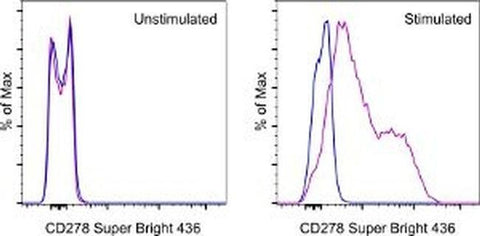
CD278 (ICOS) Monoclonal Antibody (ISA-3), Super Bright™ 436, eBioscience™
カートを見る または ショッピングを続ける
説明
PRODUCT DETAILS
Host: Mouse
Isotype: IgG1, kappa
Clonality: Monoclonal
Clone: ISA-3
Format: Super Bright™ 436
Reactivity: Human
Application: Flow Cytometry
Tested Dilution: 5 µL (0.25 µg)/test
Concentration: 5 µL/Test
Storage: 4° C, store in dark, DO NOT FREEZE!
Formulation: PBS, pH 7.2, containing 0.09% sodium azide
Purification: Affinity chromatography
Data Sheet: TDS
Specific Information
Description: The ISA-3 monoclonal antibody reacts with human CD278 also known as Inducible Costimulatory molecule (ICOS), H4, CRP-1 and AILIM. ICOS is a T cell specific activation molecule and a third member of the CD28/CTLA-4 family. Human ICOS has a relative molecular mass of 55-60 kDa, composed of 27 kDa and 29 kDa chains. Human ICOS on activated T cells has potent costimulatory activity for T cell activation and is required for humoral immune responses, in particular for memory B cell and plasma cell generation. ICOS binds to its ligand, B7h/B7RP-1 expressed on activated APCs (antigen presenting cells) and on a number of inflamed peripheral tissues. Plate-bound ISA-3 is costimulatory for T cells and induces production of IL-4, IL-5, IL-10 and other cytokines, but not IL-2. ISA-3 has the same reactivity pattern and characteristics as F44. ISA-3 was generated against the human ICOS antigen. C398.4A, anti-mouse ICOS/H4 (cat. 14-9949-82), was shown to cross-react with human ICOS but binds to an epitope different from ISA-3. C398.4A stains activated cells brighter than ISA-3; however, it also exhibits higher staining of non-activated human peripheral blood or isolated PBMC. To achieve the brightest staining of ICOS on activated human T cells, please use 13-9948-82 or 12-9948-42 rather than 11-9948-42.
Applications Reported: This ISA-3 antibody has been reported for use in flow cytometric analysis.
Applications Tested: This ISA-3 antibody has been pre-titrated and tested by flow cytometric analysis of stimulated normal human peripheral blood cells. This can be used at 5 µL (0.25 µg) per test. A test is defined as the amount (µg) of antibody that will stain a cell sample in a final volume of 100 µL. Cell number should be determined empirically but can range from 10^5 to 10^8 cells/test.
Super Bright 436 can be excited with the violet laser line (405 nm) and emits at 436 nm. We recommend using a 450/50 bandpass filter, or equivalent. Please make sure that your instrument is capable of detecting this fluorochrome.
When using two or more Super Bright dye-conjugated antibodies in a staining panel, it is recommended to use Super Bright Complete Staining Buffer (Product # SB-4401) to minimize any non-specific polymer interactions. Please refer to the datasheet for Super Bright Staining Buffer for more information.
Excitation: 405 nm; Emission: 436 nm; Laser: Violet Laser
Super Bright Polymer Dyes are sold under license from Becton, Dickinson and Company.
For Research Use Only. Not for use in diagnostic procedures. Not for resale without express authorization.
